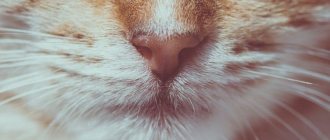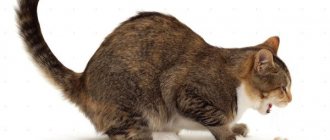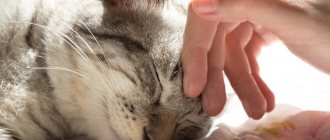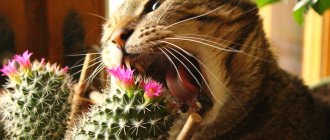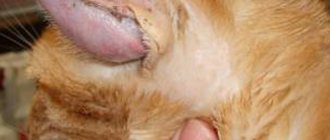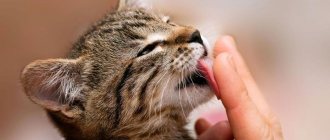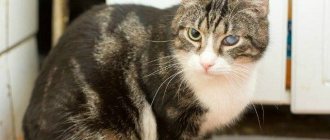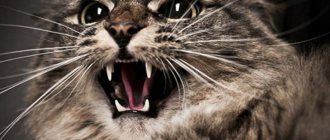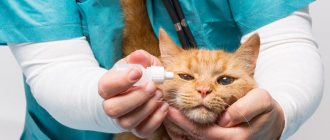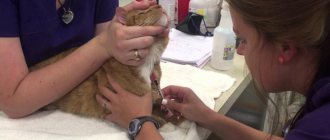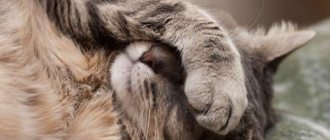6927Administration
A pet's illness is always scary, and it is not known who is more worried - the animal itself or its owner. But not all cat owners notice such a small, at first glance, problem as whisker breakage. Sometimes this is not just a physiological feature, but a signal of internal disorders. It is especially important to establish the reason why a kitten’s whiskers are breaking - the baby has just come into this world, but, quite possibly, something is already wrong with him. However, precaution is also important here - in some cases the whiskers break on their own, and there is no need to take the cat to the veterinarian. The question arises - how to determine when to worry?
The vigilant owner saw a broken mustache - what does this mean?
You probably heard in childhood that a cat with its whiskers cut off stops “smelling” or loses its sense of smell. This myth is actually reflected in the animal's loss of orientation. Whiskers - they are also called vibrissae - serve to spatially determine position. It is a fact that a cat, cat or kitten can use its whiskers to decide whether it will fit into a hole or a crack. It happens that this feeling fails them, and in the end they have to rescue the pet from trouble.
At the same time, thickening or excessive length of the mustache leads to deterioration of vision.
Some breeds (hairless, such as elf, sphinx, bambino) do not have whiskers at all; this is a normal phenomenon associated with genetic predispositions.
It is believed that the broken mustache has “served” its purpose and is replaced by a new one that has grown again. This occurs in sexually mature pets, accompanying molting, and is not considered an abnormal phenomenon. If the process begins to develop too intensively, and growth of the mustache is not observed, it is worth paying attention and establishing the causes of the pathology.
When is mustache breakage natural?
First of all, overly worried owners should understand that whiskers - or whiskers, as they are scientifically called - can fall out naturally. This process is as natural as cat or dog shedding, and there is nothing to be afraid of. Vibrissae are coarse hairs that also need to be renewed every few months. After some time, a new one will grow in place of the fallen hair. However, if a cat's whiskers break off, then this should already be a cause for concern, and it is better for the owner to eliminate the cause.
© shutterstock
Sometimes a cat has no whiskers. There are several reasons here :
- If the cat is a Sphynx breed, then the absence of whiskers is normal. Also, some other breeds hybrid with the Sphynx may also lack mustaches. At the same time, some individuals may have mustaches, and in this case, cutting them off is strictly prohibited;
- Due to curiosity, the kitten's whiskers break very often. Sometimes they get a little shorter because the desire to explore all the places doesn't always end well. Sometimes the whiskers break at the root - the cat, wanting to calm her baby, bites the whiskers;
- breaking of whiskers can occur as a result of dominance of another cat in a peculiar tribe.
All these cases are natural and there is no need to worry. After some time, the broken mustache will grow back.
Causes of vibrissae breakdown
They are as follows:
- Diet-related calcium deficiency. The food has an unbalanced composition or is simply not suitable for a particular pet. In addition to the whiskers, the claws also suffer, losing their hardness and becoming loose and layered. In addition to reviewing the purr's diet, the owner should stock up on vitamin and mineral supplements.
Important! It is impossible for a mustachioed pet to contain powdered dairy products in its diet; this requirement also applies to shelf-stable goods.
- A small amount of water in the diet provokes the loss of mustache and other unpleasant diseases.
- Reactions associated with intolerance of a specific substance by the body (allergy). For example, a flea bite due to the presence of a protein, a food component, that is atypical for a cat’s body.
If there are several animals in the house, their whiskers may fall out during fights between them: the cats find out which of them is the leader.
- Pathogenic bacteria and fungi, parasites (lice eaters and helminths): weakening the body, they negatively affect the appearance of the animal.
- The heating season and the dry air that accompanies it.
- Genetic structure - hairless cats may not have whiskers (or they fall off profusely).
- Frequent water treatments accompanied by washing with shampoo (if the product is of poor quality, the skin will be injured and peeled, and dandruff will appear).
- Disorders associated with hormonal levels. If the thyroid gland does not perform its function, the animal suffers from excess weight and brittle hair and whiskers.
- Malfunctions of the urinary system and kidneys (renal failure, urolithiasis).
Reasons why a cat's whiskers break and fall out
Sometimes a mother cat chews her kittens' whiskers to calm them down.
With age-related changes, the thin hairs of little furry friends break off and are replaced by strong and thick ones. But sometimes a furry cat's whiskers break for other reasons. These include:
- Presence of parasites. Fleas, helminths, and ticks affect the weakening of the tailed organism. In addition, the animal may have lice eaters, which chew through the hairs at the base.
- Fungal infection. Because of it, hair follicles can become clogged. Then the cat develops scabs and hard hairs grow into the skin.
- Unbalanced feeding. Poor quality food and lack of vitamin and mineral complexes negatively affect the pet’s health. The cat may also not be taking in enough fluids.
- Metabolic disease. Improper metabolism affects the functioning of internal organs, which affects the appearance of the animal.
- Genetic predisposition. Some cat breeds lose coarse hairs more often than others.
- Sometimes a mother cat breaks off the kittens' whiskers if the animals are together longer than expected. This is how she shows her authority or tries to calm the cub down.
- Tricks of children. A child may mistreat an animal and injure it.
We advise you to tell the little residents of the house how to behave with your pet. The child must know what not to do with the pet so as not to injure the cat!
How can the owner help the pet?
If your pet has severely lost its whiskers, it is necessary to carefully examine it. Itching and skin diseases provoke hair loss and peeling of the epidermis in the sore spot. The animal can be especially bothered by head itching - as a result of constant washing and rubbing, the muzzle and whiskers will break off.
Itching is caused not only by food allergies, but also by atopic dermatitis, parasitic disease or lichen. The latter is extremely unpleasant due to its contagiousness, including to humans.
If focal baldness is detected, it is necessary to contact a specialist at the clinic. What else needs to be done?
- Firstly, the owner is obliged to establish what exactly the problem with the loss of the mustache is. Do the living conditions correspond to the normal existence of the animal - does the cat drink too little water, does it bathe often, is the air humid enough, what kind of food and shampoo is used.
- Preventive measures for deworming and eliminating parasites are carried out at least once every 4-6 months.
- With a cat, a visit to the clinic is necessary in case the pet is infected with a fungal infection or has a chronic disease.
- Be sure to review your diet and add foods rich in vitamins, minerals and healthy fatty acids. It is better to raise babies on natural food. If possible, buy holistic foods and premium food.
What to do to stop breaking and loss of whiskers
Do not self-medicate and contact your veterinarian.
After a clinical examination and tests, the animal will be diagnosed and the correct treatment will be prescribed.
Loss of whiskers is an important symptom that accompanies a variety of diseases, so it is important to determine the exact cause.
Typically, therapy includes:
- anthelmintics and antiparasitics, which help get rid of parasites;
- antihistamines, eliminating allergic reactions;
- antibiotics that fight infections;
- vitamins and minerals that help restore immunity.
It is equally important to normalize the living conditions of the pet, due to which the whiskers may fall out:
- Eliminate excessive dryness in your room using a humidifier.
- Shorten your baths and change your shampoo.
- Buy fatty acids, biotin and taurine. Strictly follow the dosages prescribed by your doctor. Excessive amounts of vitamins will lead to new problems.
- Eliminate stress factors . Stop negative relationships in the cat community.
- Switch to quality food. Remember that changing feeds occurs gradually by mixing a new option into the old one.
- Keep an eye on your water balance . Use any tricks, but ensure sufficient fluid intake.
A cat that has lost its whiskers is unable to navigate in a dark room and checks the temperature of food with its paw.
For prevention, you need to stop giving your pets cheap dry food
Preventive measures
Will help reduce the risk of your pet's whiskers breaking off. Owners can periodically treat for fleas, worms, and other parasites. The pet is given enough clean, fresh water. The room where the cat is kept is regularly ventilated and moistened. A selected and balanced diet includes supplements of minerals and vitamins. The animal is vaccinated against infections of viral origin. the number of water treatments is reduced, and the detergent must be suitable for the cat.
Important! You should not self-medicate your pet - it can take his life, consult a specialist!
If the cat, despite breaking off its whiskers, remains active and cheerful, then there is no reason to panic. A consultation with a veterinarian won’t hurt, and treatment and corrective care will make your cat’s life even better.
Mustache care
Why a cat tramples its paws: the main reasons and what it means
There are no special mustache care procedures. The place where they fall out or break does not need to be processed, as well as any other procedures. However, there are a number of manipulations that definitely should not be done.
Do not pull out, break or trim your mustache. Even if there is a suspicion that they are too long or the cat is uncomfortable walking with them, removing the whiskers and violating their integrity is prohibited. In addition, the rule that if you trim the whiskers, they will grow longer in the future - this is fundamentally wrong.
The loss of 1-2 antennae is not dangerous for a kitten and is natural. In other cases, you should take a careful look at the animal and try to find the reason for the massive loss of its senses of touch. If there are accompanying symptoms, as well as suspicions of the presence of disease or parasites, you should consult a veterinarian. An examination and tests will help identify the cause of the loss or deterioration of the kitten’s whiskers.
Prevention
To prevent your young pet from having problems with its whiskers, you need to pay closer attention to it and follow some rules.
- The kitten should eat something with balanced, high-quality food. An organism that receives what it needs for further development will enjoy good health.
- If there are other pets in the house, you need to do everything to protect the kitten from them. When he grows up, he will be able to fight back against them on his own, but while he is small (up to 3 months), he would rather not allow any skirmishes or showdowns.
- In order for uninvited parasitic guests to not settle in your cat’s body, it would be worth constantly washing the cat and giving anthelmintic drugs.
Of course, the necessary quality assistance can only be provided by contacting veterinarians. And if you constantly visit veterinary specialists, then all potential problems relating to cat health, (God) ordered, will be recognized before they arise. And he digs everything without any problems so that complications leading to mustache loss do not arise.
The kitten has a weak immune system
Whiskers are hard, tactile hairs that protrude above the surface of the fur and are necessary for the normal existence and functioning of cats (they are often called whiskers). They are located above the eyes, on the lower lip and on both sides of the nose, where the whiskers are longest and thickest.
It is very important for a kitten, even an apartment one, to have healthy, strong whiskers. A caring owner may notice a broken or fallen mustache in the apartment, how to react to this, is this normal or should I worry?
There are not many reasons why kittens lose or break their whiskers.
The first thing you need to pay attention to is the kitten's nutrition. Your pet's daily diet should contain a normal amount of vitamins, minerals and trace elements.
It is better to feed small kittens with natural food or buy expensive elite food. Cheap ready-made food is unlikely to have everything you need.
A rare loss of whiskers in a kitten does not predict anything terrible and there is no need to worry about the baby’s health, just reconsider the quantity and quality of the food he eats.
The second reason is adolescence and it passes for all kittens individually. Hair falls out, baby teeth fall out and whiskers recede. At this age, it is necessary to increase nutrition with calcium, vitamin D and vitamins, omega-3 fatty acids. With this approach, the kitten’s body will quickly cope with the period of growing up and the problem will pass.
But before giving vitamin complexes on your own, you should visit a veterinarian and only he will know which ones are needed. An overdose of vitamins is much worse than a deficiency!
- In very rare cases, the cause of mustache breaking is a fungal disease, and here you cannot do without qualified help.
- The caring behavior of a mother cat can cause the kitten's whiskers to break off. Active games with brothers or other animals in the house can also be a reason.
- Little children, out of their unconsciousness, can drag kittens by their whiskers and of course they break and fall completely, firstly it is painful, and secondly it is stressful for the little predator.
- Cruelty or curiosity provokes the fact that one of the family members or guests deliberately cuts off the cats' whiskers. This is not acceptable, watch this!
For apartment kittens, a broken mustache is not a very terrible loss, but for street revelers it is more difficult because the mustache takes part in everything.
For example: a landmark in space, they help to estimate the size of a space or hole, control prey, move in the dark and hunt.
Be that as it may, the whiskers must be restored so that the kitten lives a full life and brings joy to all family members!
Source: https://myshek.net/kotjata/pochemu-u-kotyonka-lomayutsya-usy.html
When not to worry
There are reasons that are quite natural. For example, many sphinxes do not have mustaches - this is absolutely normal for their breed. However, if the bald man still has whiskers, then there is no point in cutting them off.
By the way, a cat can bite off the whiskers of its kitten in order to calm it down. In these cases, a broken mustache grows back quickly.
This is interesting: the owner of the longest whiskers in the world is a Maine Coon named Missy. She lived her whole life with a mustache 19 centimeters long.
What can be done about this problem?
What should you do if your cat’s whiskers begin to fall out and break? The universal answer is this: the first and most important thing an owner can do for their pet is to calm down, pick up the animal and take it to the veterinarian. Under no circumstances should you try to cure this problem yourself, because most often mustache loss is a symptom, not a disease . In general, no special actions can be taken in this case - you should not comb your mustache or lubricate it with any oil, you just need to find the cause of this problem and eliminate it.
How to prevent a cat's whiskers from falling out?
To do this, you must adhere to certain rules.
How to prevent your cat's whiskers from falling out:
- Be sure to use anthelmintic drugs for prevention.
- Give your pet food that is appropriate for its age and needs for vitamins and minerals.
- You should not feed your animal exclusively with economy-class dry food, since it contains little protein, a lot of carbohydrates and a decent amount of preservatives and allergens.
There are many interesting facts about cat whiskers. Oddly enough, not all animals can boast of having vibrissae. For example, there are breeds, such as the Sphynx, that do not have coarse hair at all. Scientists have not fully figured out how a cat senses objects and navigates in space. Presumably she does this using her bald skin, which is very sensitive.
Maine Coons are the most mustachioed. This breed has hair that reaches 20 cm in length. Thanks to this feature, the breed was included in the Guinness Book of Records. It is also necessary to take into account the genetic characteristics of some animals. For example, sphinxes are distinguished by thin skin and the presence of minimal hair on the skin. In this regard, the antennae are very soft, quickly break and curl. It is these cats that most often experience whisker loss, but there is nothing wrong with that.
cat
Reasons leading to mustache breaking off
There are many reasons why a kitten may lose its whiskers. You see the most common ones:
- The air in the house is too dry. If the atmosphere in the apartment is too dry (which often happens in winter, when there are a lot of heating devices), then the kitten’s whiskers may begin to break. This can happen to any cat.
- The kitten is bathed too often using bad shampoos. Often, when bathing a cat, and at the same time, lathering it with low-quality shampoos, the owner easily does everything so that the pet develops seborrhea - black skin. In which the vibrissae also break off and fall out.
- The kitten is growing up. To die and not get up during adolescence, the kitten's metabolism is disrupted, which means the whiskers can also break off.
